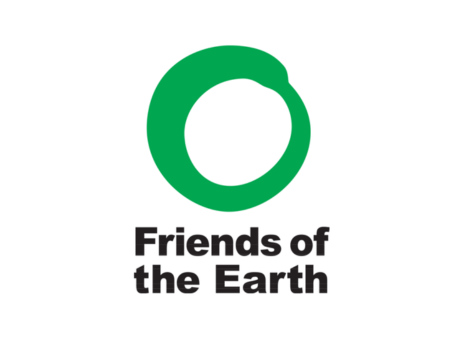Friends of the Earth campaigns to address urgent environmental and social issues.
Michael Khoo of Friends of the Earth spoke with Jessica Kantor on February 6, 2024. Click here to read the full interview with insights highlighted.
Jessica Kantor: Can you introduce yourself, the organization that you’re with, and the problem that you’re working to address?
Michael Khoo: I’m Michael Khoo, and I’m the Climate Disinformation Program Director at Friends of the Earth. Our goal is to fight the many fossil fuel funded interests that have spent fifty years promoting climate denialism and attacking climate science — the things that really are standing in the way of progress on climate action. With the advent of social media and artificial intelligence, we’ve had to continue that work on a new generation of tools that spread climate disinformation.
We work in a number of different ways. First, we have a broad coalition of environmental groups and intersectional groups — both in the US and across the world — who coordinate research to understand the problem as it evolves, to communicate strong messaging, and to develop frameworks by which to analyze the problem.
We learned very early on that you can’t play whack-a-mole with climate disinformation. You can’t just focus on educating people to be media literate, or knock each piece of climate disinformation one by one. Everytime you shut down one piece, it reappears somewhere else. That phenomenon led us to do more research to figure out why that happens. The obvious and quick answer was that there were networks of professionals who have long-standing relationships with climate deniers that are paid to attack climate sciences and renewable energies.
Our theory of change is that we need to stop it at the source — stop the production of it and stop the artificial amplification of it. It’s one thing for Tucker Carlson to make a living lying about it, it’s another to have the YouTube algorithm grant him a much more widespread audience.
We witnessed this during the historic Texas snowstorms in 2021. The energy infrastructure, predominantly fossil fuel, froze up. As a result, hundreds of thousands went without power and people died. It was obviously a climate-induced, extreme weather event coupled with a failure of the fossil fuel infrastructure.
In response, the fossil fuel industry and its proponents — oil and gas lobbyists — started a meme to say that the problem was frozen windmills. They blamed people’s deaths on the investment on the unreliable technology of windmills. That discussion dominated Twitter (now known as X) for over four days. By day three, it was on Tucker Carlson’s show; and by day four, Governor Abbot’s lips were saying that this was the problem.
We documented this, and it’s unfortunately only one of hundreds of examples we have of false market share and mindshare that the climate disinformation has managed to get in the American political discourse.
Jessica Kantor: What other action items is your organization doing to cut that off at the source?
Michael Khoo: We’re constantly studying the problem because it evolves quite a bit each year.
Another example is the research we did at COP27 [27th United Nations Conference of Parties] which is an international Climate Change Conference.
Facebook announced this very expensive initiative to fight climate disinformation — which we pushed for them to do — so we were excited for the Climate Science Information Center. We monitored the traction of Facebook’s own attempts of inoculating on its platform and how that performed next to climate disinformers; we found that disinformers outperformed Facebook by a factor of twelve-to-one. It really put to bed the idea that you can fight this trench warfare word for word. That led us into a deeper power analysis of why that is when the majority of Americans actually believe that climate change is real and think that humans have something to do with it.
We have all these facts on our side, but in this ‘public sphere’ — which is not actually a public sphere — of social media platforms something is happening underneath the surface. We started looking at the algorithmic discrimination and amplification that gives small minorities a massive outsized voice; it was a fundamental power analysis as we were seeing democratic values being betrayed.
Because of that, we now focus our work on having regulation on the tech industry and related offline industries. When people think about tech, they think it’s this magical thing that runs on its own and makes its own decisions. Meanwhile, we try to get people to think about sausages and airplanes; two long-standing industries with very transparent systems on how things are regulated.
When people get sick from e.coli in sausage, there’s a chain of reporting; when an airplane has a door blow out mid-flight, there’s accountability. Yet somehow, we don’t have regulatory systems to hold tech companies accountable.
Contrast that with how we look at problems on Facebook or X. When Facebook was accused of aiding in genocide in Myanmar, their first reaction was to deny that happened on their platform. Three studies later, they go from minimizing what happened to claiming they’ve already taken care of it. It’s an endless Kabuki Theater. They use the exact same playbook each time to avoid doing what is expected as a normal course of business. In fact, sometimes, it’s the CEOs of tech companies responsible for spreading the misinformation.
For example, Mark Zuckerberg lied under oath in Congress about the harms of increased eating disorders and mental health issues on young women using Instagram. He claimed there was no issue, but later, we find out that he actually saw and commissioned the studies that revealed this information. Can you imagine the CEO of Boeing claiming that a plane didn’t go down?
The tech industry is another universe. Tech companies have been given a free pass by Congress and congresses around the world over things that we wouldn’t allow in other parts of society. We are big believers in democracy, so government needs to be a lever in this change. We can’t just kindly ask Mark Zuckerberg or Elon Musk to become better people.
So our focus needs to be on two things (1) the production of climate disinformation, which is a certain set of well-known climate deniers funded by the fossil fuel industry (2) those who are monetizing the disinformation, which are the tech companies.
Jessica Kantor: What makes your approach distinctive?
Michael Khoo: I hope there’s actually nothing distinctive about what we’re doing compared to many other advocacy campaigns. We’re big believers in the basic mechanisms of democracy — pushing elected officials to create policies and having businesses work for the people.
That might be a very boring sounding old-school way of doing things, but there are many technological things that focus on what seem to be new conversations, yet it really comes down to the basic principle of transparency. People need to know what companies are doing, and they shouldn’t be allowed to hide it. That all comes down to systems for safety and accountability.
If you look at the beginnings of the regulation of the meat industry, you see that systems were created to ensure that we know what is going on in and coming out of meat factories. Without safety standards, we can’t have accountability. If we find something wrong, products need to be recalled. If someone dies or is harmed, somebody needs to be held accountable.
I really resist the Silicon Valley driven approach of coming up with new languages or new frameworks. For example, when we talk about AI, a lot of well-meaning pundits say things like ‘alignment’ is AI’s first problem. Alignment is just some terrible euphemism for democracy. Then, they talk about ‘mechanisms’ but what they’re really referring to is administration.
What should be done is what the population says should be done; they control the country, which means you administer that through the government. People frequently use these alternative words, especially in the field of technology, that take us away from the core values of what we all understand and can actually agree on.
I’d like for us to go back to the core principles of American democracy — freedom, transparency, and accountability — and not think that these companies should be looking at it in any other lens from that. What they’re doing is not different from the long history of people doing power analysis — from unions to women’s reproductive health movements — of who is controlling things and who needs to be held accountable.
Otherwise, there’s been no technology infrastructure analysis within the environmental movements. The process for the last forty years has been to do a report on an environmental harm in an area and get an expose written, then, people get outraged and organize, and all of a sudden a bill passes. That’s actually how we have the TSCA [The Toxic Substances Control Act of 1976] Laws today.
That entire process was broken, and remained so until the early 2010s when the internet became a great decentralized organizing force. At the same time this was happening, capitalism really discovered how it could also be used to surveil and extract information from people. That massive shift affected the entire progressive movement.
In doing our network analysis, we found that the same problems that affect people pushing for climate change policy are the same problems that affect the people fighting for rights of trans youth, the people fighting against non-consensual deep fake porn, etc. Movements concerning women, LGBTQ, immigration, and many others are similarly being attacked by a small number of people on the internet while social media platforms allow them to game the systems in order to monetize them.
Our first network map was done by Graphika — the same one who analyzed the 2016 Russian hacking of our electoral process — who helped us build a map of climate deniers. We used the database of an excellent organization, DeSmog, to put it together, and that revealed a long history of the people paid to spread climate disinformation.
We used that as our starting point. We started with 500-700 people, and built a map of those people; we put a circle around them to see what they do. We watched as this map evolved and saw different issues come up. We launched it two months before the pandemic, which was both great and terrible. It destroyed our map at one level, but what we saw was that the climate deniers in February became anti-maskers in April, then anti-BLM conspiracists by June. Later, they became misogynists against Kamala Harris being named Vice President.
It was the same group of people who were given an outsized influence, so it was heartening to confirm a lot of things that people already thought: there is a common cause across a lot of this country, but a small group of people are taking an outsized power against many others.
We work in a deep coalition with other groups. We worked with Pinterest, a smaller social media platform, to develop their climate disinformation policy two years ago. Before endorsing it, we required that they speak with the reproductive health groups, abortion groups, LGBTQ Rights groups, and others as well. We had to make sure that they were good with what we’re doing with regards to the transparency and reporting measures.
As a relatively rich and predominantly white environmental movement, we often get the first seat at the table. We have a long history of corporate greenwashing that says they care about the planet, which is longer and deeper than the corporate history of saying they care about LGBTQ or civil rights. We recognize our positional power, so we need to make sure that we don’t get things at the expense of others; we need to strengthen that by recognizing it from the outset.
Jessica Kantor: What are some things that you’ve tried that didn’t work? Are there lessons that you have learned from those?
Michael Khoo: It’s hard to characterize what didn’t work because they’re really learning experiences.
For example, we decided to focus on Spanish language climate disinformation. We started our first year by wanting to broaden and deepen our partnerships to cover more of the country. When we did our first research paper on the nature of how climate disinformation is created and spread within Spanish and Latinx communities in the USA, it really blew up our understanding of how different the problems are from the English language climate disinformation. It created a whole set of different problems really. One of the first findings in the Spanish study was that translation and international networks were much more important.
Wildfires in Spain were actually the biggest source of North American disinformation in Spanish. Second were the English-speaking climate deniers in the USA being translated in South America and being bounced back to the USA. That gives you a very different set of challenges for regulatory response.
Naturally, that led us to be more internationally focused, so we’re working with the United Nations to help them recognize the problem of climate disinformation. We now work on regulations in half a dozen different countries because if you can get eight of the biggest democracies to pass these policies, it helps reign in what is obviously an international internet since companies like Facebook, X, Google, and many others all operate in those countries.
It’s a long way of saying that we’re learning how the nature of climate disinformation is changing, and that leads us to have different advocacy campaigns — partly geographically, but also looking at the different mechanisms by which people are gaining power.
The core analysis has remained the same, that hasn’t changed: there is a small group of rich people who are facilitating what I would call the modern-day Brownshirts of the Weimar Republic that have an outsized and very violent amount of power in our society. We try to be open to that not being the case — we would love that — but it seems to only prove itself more and more by the month.
Jessica Kantor: What you brought up about the Spanish language reminded me of what I’ve learned in the past few years where a lot of misinformation is actually spread from the diaspora itself on platforms like WhatsApp and Signal. Those platforms can’t and don’t necessarily have the same type of regulatory capabilities because they’re not forward facing, so it becomes more about teaching people what misinformation and disinformation looks like, and how to have those kinds of conversations with your family members. Can you share a bit about the work you’re doing in regards to that?
Michael Khoo: We have a pretty big coalition, so other people are more focused on media training and media literacy aspects of what we do. We’ve also produced climate disinformation guides, and done training for journalists and grassroot members internationally. That’s important to do because with the decentralization of social media, it’s our way of supporting partners in our network to address these issues within their specific communities.
One of the biggest challenges of the job of media literacy is that it’s just so big. There’s eight billion people, and a whole bunch of competing agenda items on how and what to educate everyone about. Within the United State public school system, there are extremely polarized forces attacking teachers for teaching about climate disinformation at schools.
While I believe media literacy should be done — we even have recommendations for every branch of government for what they need to be doing — I’m not hopeful that they would be able to withstand the political forces that attack them for doing those things.
Another important understanding that’s good to have is that we’ve grown up on the fossil fuel industry making people think that climate change is their fault. One of the first examples was pollution and litter. In the 1970s, the fossil fuel industry funded campaigns that made people feel responsible for litter. “Doing your part” to recycle has become deeply ingrained in America; a huge portion of Americans believe that it is an important thing to do. There’s been this amazingly successful and darkly cynical redirect of people’s goodwill towards something that does almost absolutely nothing.
Only 6% of all things that go into a recycling system ever gets recycled. 6%! So the other 94% is just thrown out or incinerated, all sorts of terrible things. The real social problem is that we’ve built a whole culture of saying that you have to do that in order to be a good citizen as opposed to stopping the fossil fuel, plastics, and petrochemical industries from dismantling the reusable glass bottle system… which they actively did step-by-step. They took over that system by buying it up and replacing it with plastic bottles. While they were doing that, they even funded the early recycling systems.
In Toronto, the recycling system was created and awarded funding by Coke and Pepsi. After that, they phased out the glass bottles, then stopped paying for the recycling system. The offshored to taxpayers what had been a normal business expense of producer responsibility for their own garbage. Along the way, it’s made people feel good about recycling plastic bottles that ultimately did nothing for the environment, but still made people feel like they were actually doing something.
I worked on recycling; it’s one of the first things I ever did. Getting people to understand that it was the petrochemical industry that got them to start recycling so their companies could produce more plastic is an ‘aha’ moment that helps a lot of people understand the betrayal of these industries.
Media literacy on climate disinformation is important, but the incentives from social media and internet industries like Google and Youtube are so deep and so strong that it is asking far too much for any individual to understand what is within the algorithm of TikTok that is making them stay on it late into the night.
These are products that need to be regulated on a whole variety of levels to stop the flow of disinformation before it starts as opposed to thinking that we can make people responsible for becoming more media literate.
Jessica Kantor: How are you measuring success?
Michael Khoo: Our main North Star is to have industries that spread climate disinformation regulated in order to reduce their overreach and their artificial amplification. Towards that, we press the governments — particularly Congress in the US — to develop regulations. We’ve been hugely unsuccessful in getting anything introduced to regulate Big Tech in the United States, but we have had a movement towards introducing these ideas into legislation.
Representative Lori Trahan has a great bill on data and algorithmic transparency that we’re rallying the environmental community to support. While the bill doesn’t specifically mention climate, its contents contain some of the most important things for the future of our advocacy, so we’ve helped build support for that. Hopefully it’ll be translating to more real rules that are coming with artificial intelligence because everyone seems to understand that problem a lot more easily.
Regulations have been proposed internationally in the EU and the US that pushes for transparency, accountability, and safety standards. The AI industry is really talking about safety — whether or not they’ll do anything about it is another question — so those principles do show up. We’re definitely following that policy path of focusing on AI because that seems to be the only thing that Congress has a chance of passing.
Another thing we’ve been working hard for is to press all the top platforms to create climate disinformation policies. Over the last two to three years, we’ve gotten a policy out of all the major social media platforms including Facebook and Twitter (now known as X).
Before Elon Musk, Twitter (now known as X) created a climate science topic area populated by only climate scientists. Climate scientists can and do disagree, which is great, but that’s different than having climate scientists fight individuals like Andrew Tate who has no business talking about climate science. It was exactly what we asked of them. It’s actually very simple to solve some of these problems if there is political will within the companies.
We’re also interested in the fact that the disinformation industry is actually estimated to be anywhere from a $5-30 billion a year business, yet that’s not getting notoriety or attention. We’re focusing a lot more on the ad tech market and have done exposés on Google and Youtube’s monetization of that. As a result, we got Google to create a policy that does not allow for the monetization of climate information; which they’re not enforcing anywhere close to where they should, but the policy is on the books.
We’ve also gotten similar policies out of Twitter (X), Facebook, and Pinterest. These policies have really been a saving grace in keeping up the momentum and ensuring that these issues are at the forefront as we see how new technologies, like AI, might be threatening people everywhere. It ensures that basic ideas of safety, transparency and accountability are incorporated into those new systems.
Jessica Kantor: Are there any challenges that you’re currently facing that you haven’t been able to overcome or solve?
Michael Khoo: The big one we are up against is the fossil fuel industry having unlimited amounts of money and unlimited amounts of political influence. That’s the biggest long-standing one. In the intermediary, we’re focused on tech companies that are repeatedly treated with kid gloves by regulators.
We’ve been dealing with fossil fuel industries funding climate deniers for over a hundred years, so the baton has been passed to us to take that work into these next waves of technology.
Otherwise, we’re always trying to partner as much as possible. The problem that we are facing is multilevel, interdepartmental, cross-organizational and intersectional.
It’s multilevel because the CEO cares about it as much as the social media intern; they both are fighting climate disinformation. One is fighting it in the trenches while the other realizes it could torpedo any future climate change legislation.
It’s interdepartmental because the oceans program cares about it as much as the food and agriculture program as much as the climate change program.
It’s cross-organizational because the Environmental Defense cares about it as much as the Friends of the Earth. And indeed, when we created the coalition, we anchored it with those two groups and actively solicited the Environmental Defense to be the Co-chair so that we have a more centrist group and a more radical group uniting. And it’s intersectional because as I’ve touched on before, those fighting for LGBTQ rights, reproductive rights, etc. are all fighting the same forces as we’re fighting within climate change.
There are different ways to think about the problem and different ways for organizations to reach out to partners throughout the movement.
We hold these voluntary meetings as a coalition, and we have people ranging from the C-suites of large organizations to interns of smaller organizations coming with the same level of interest and passion. That’s pretty unusual and that’s actually the problem. We have to reflect on where the problem sits within organizations. It continues to be a challenge that everyone would like to fit into its own neat box when this is a problem that, by its nature, crosses many lines.
Jessica Kantor: How do you see your work evolving over the next five years?
Michael Khoo: The broader trend that we’re worried about is the overall health of the information ecosystem, which is currently dominated by the current state of social media and the state of information search platforms. It’s degraded so much over the last few years.
We’re also watching the intersection of how AI and new technologies, like ChatGPT, are replacing the entire nature of information search. We need to adapt for that concentration of power to shift into even fewer hands and even more opaque systems. Related is thinking about how news media is impacted by these changes as their business model is dependent on outbound clicks and outbound referrals.
We’re in the middle of a complete evisceration of the journalism world for any mid- and small-sized outlets. The center is absolutely cratering, and the next twelve months are going to be brutal to watch. It’s going to leave everybody scrambling for what is next on how to deliver information and how to resource local papers that have been upholding this democracy. So much of that money is being directed to very large Silicon Valley companies.
For example, the Baltimore Sun was just sold to some venture capitalist right-wing person, and they’ve just hollowed it out, sold it for parts, and turned it into some weird clickbait version. There are still organizations like the New York Times that are still thriving, but very few journalists will be lucky to work at The Times. Our concern is what that will mean for the health of our information ecosystem and how it’ll affect how democracies function.
Click here to read the full interview with insights highlighted.
Jessica Kantor is an independent journalist specializing in health, human rights, and social impact. Her work can be found in Fast Company, Healthcare Quarterly, The Las Vegas Review-Journal, and others. She is a living kidney donor.
* This interview has been edited and condensed.
Find other innovations addressing environmental issues.







